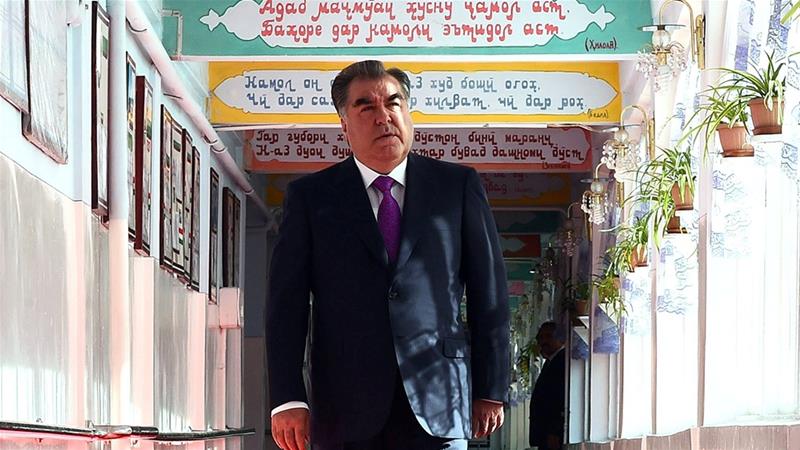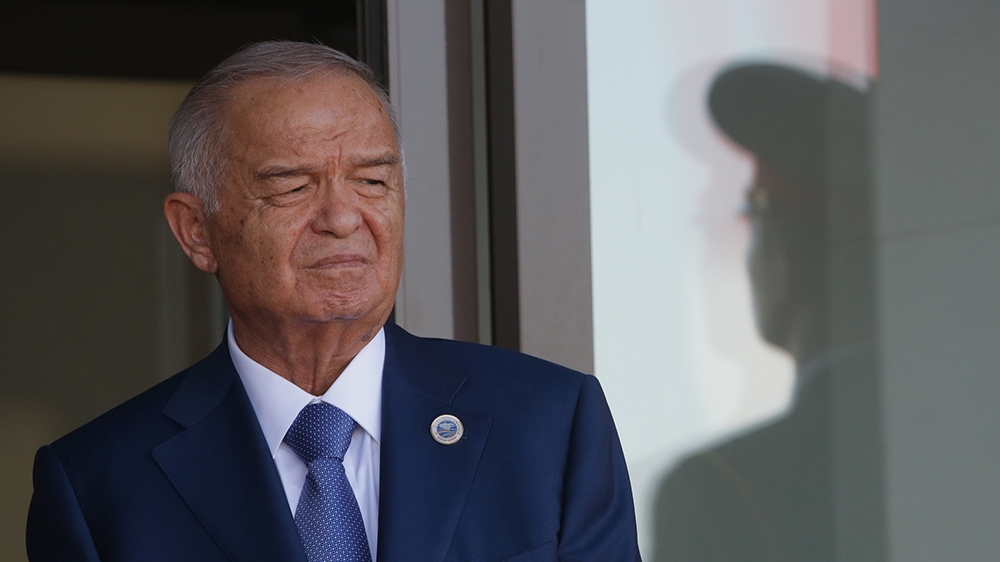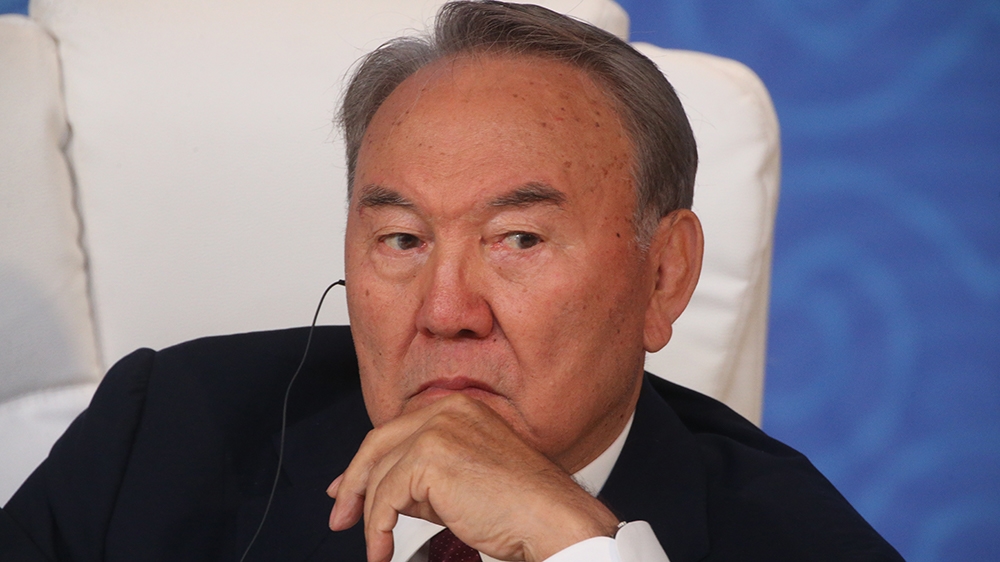 Analysts say opposition is purged in Tajikistan, Uzbekistan and Kazakhstan whenever there is a perceived threat.
Analysts say opposition is purged in Tajikistan, Uzbekistan and Kazakhstan whenever there is a perceived threat.
The Islamic State of Iraq and the Levant (ISIL, also known as ISIS) last month claimed responsibility for its first attack in Tajikistan, the poorest ex-Soviet state that shares a border with Afghanistan.
On July 29, a grey saloon car repeatedly ran over a group of Western tourists cycling towards the Pamir Mountains.
The attackers later used knives and axes, killing two Americans, a Dutch citizen and a Swiss national, and injuring three more people, police said.
Two days later, in a video, ISIL said five attackers had pledged allegiance to it.
The claim prompted concerns about a potential new front for the cornered group that has lost most of its territory and fighters in Iraq and Syria and seeks a toehold and more recruits in Central Asia, a resource-rich region of more than 60 million people.
But analysts say that to Tajik President Emomali Rakhmon, who has ruled the nation of nine million for 26 years, the attack was another excuse to crack down on his domestic opponents.
His government claimed that the attackers were members of the Islamic Renaissance Party (IRP), a coalition that has denounced ISIL.
"Tajik authorities have always emphasised the threat of radical Islamist movements and organisations to pursue their own goals - to either get international aid or justify harsh steps within the country," Parvina Khamidova, a US-based Tajik publicist, told Al Jazeera.
Other Central Asian leaders have used imaginary or real threats posed by ISIL, al-Qaeda or homegrown groups to justify purges of opposition, critics and worshippers who attend mosques the state considers suspicious.
"Since there is only a handful of ISIL fighters in Central Asia, [authorities] present anyone they can as such - radical Islamists of all kinds, criminals and even undesired adherents of traditional Islam," Valentin Bogatyrev, a former adviser to several Kyrgyz presidents, wrote in an opinion piece published by the Ferghana.ru news agency.
'Shameless and illogical slander'
In 1997, Rakhmon, a former collective farm chairman and minor Communist official, struck a deal with the IRP and other opposition forces to end a five-year civil war.
Once Tajikistan's second-largest political party with tens of thousands of members, it was also the only Muslim party in the former Soviet Union - a fact Rakhmon hailed as an example of Tajik democracy.
But in 2015, he banned it as a "terrorist organisation", and courts sentenced dozens of its members to up to 28 years or life in jail.
Two days after the tourists' killing, police killed four attackers and arrested five more men.
One of them "confessed" to visiting the Iranian city of Qum for "ideological and military training" and meetings with an IRT official, the Interior Ministry claimed (warning: hyperlinked article contains graphic images).
Despite linguistic and cultural ties to Iran, Tajiks are overwhelmingly Sunni. Qum is the world's largest centre of Shia learning, and an unlikely place to provide Sunnis with "military training".
"We consider it a shameless and illogical slander," the IRT's exiled leaders said in a statement. "Unfortunately, the Tajik authorities, as always, have tried to use this human and national tragedy for political purposes and against peaceful opponents."
Meanwhile, one of Rakhmon's own security chiefs, Col. Gulmurod Khalimov, joined ISIL.
He was head of Tajikistan's riot police force, who underwent extensive training in the US along with hundreds of Tajik security officers, but in 2015 left for ISIL-controlled territory and eventually became a "war minister" with the armed group.
His defection made him "the poster child for the folly of US military assistance in Central Asia", wrote John Heathershow, an expert on Tajikistan.
Despite Khalimov's defection, the US continued to school Tajik servicemen - last year alone, they trained and equipped 1,700.
Since its independence, Tajikistan received almost $1bn in aid from the US.
Khalimov was reportedly killed in Mosul in 2017.
Up to 4,000 Central Asians are believed to have joined ISIL and travelled to its territory because they feel marginalised politically and economically, while their leaders "are tempted to exploit the phenomenon to crack down on dissent", according to a 2015 report by the International Crisis Group, a think-tank.
Uzbek purges
In neighbouring Uzbekistan, late President Islam Karimov jailed hundreds of suspected ISIL supporters, continuing decades of pressure on alleged sympathisers of al-Qaeda and Hizb-ut Tahrir, and peaceful Muslim government critics.
"The so-called fight against Islamic fundamentalism resulted in a complete purge of the political and civil landscape," Nigara Khidouytova, an exiled leader of the Free Farmers opposition party who lives in Los Angeles, told Al Jazeera.
Her husband was killed in 2005 in what she called a government-orchestrated attack, and her sister and cousin, who co-founded Free Farmers, were sentenced to 10 and 14 years in jail, respectively.

Uzbekistan's late President Islam Karimov jailed hundreds of suspected ISIL supporters [Mikhail Metzel/TASS via Getty Images]
After the September 11, 2001 attacks, Karimov offered Uzbek soil and air to transit NATO servicemen and cargo to Afghanistan, and received tens of millions of dollars in US aid.
Washington invested to turn a Soviet aerodrome on the Afghan border into a first-class airbase.
But after the West criticised Karimov's 2005 crackdown on an uprising in the eastern city of Andijan that left hundreds of civilians dead, he sent the Americans at the base home.
After Karimov's 2016 death, his successor Shavkat Mirziyoyev started reforms, releasing political prisoners, purging corrupt officials and cutting taxes.
But his government continues Karimov's policies of imprisoning Muslims accused of "radicalism."
"Their criminal cases are fabricated through the use of torture," Uzbek rights defender Surat Ikramov told Al Jazeera.
'Ideological mutations'
Several Central Asian rulers present themselves as proponents of secularism and democracy.
But experts say their nations are afflicted by nepotism amid deliberately restored feudal systems of government.
"It is the suppression of critical thought and liberal intellectuals that leads to active domination of primitive archaic groups that provide false short-term stability, but result in the degradation of the economy, politics and education," Rafael M Sattarov, a visiting scholar at George Washington University, told Al Jazeera.
To fill the void left by the communism and to counter the resurgence of Islam, they came up with what Sattarov calls "ideological mutations."
Uzbekistan lionises the medieval conqueror Tamerlane, known for his unprecedented brutality.
Tajikistan's Rakhmon promotes "Aryan" culture - meaning Iranian culture with an emphasis on the Samanid dynasty that broke away from the Abbasid caliphate and revived pre-Islamic traditions.
In Turkmenistan, the government of President Gurbanguly Berdymukhammedov, does not publicly discuss any threats posed by ISIL and has jailed dozens of young men in recent years for their "excessive religiosity", an exiled Turkmen analyst says.
"The authorities actively suppress any form of fanaticism," Ruslan Myatiev, who runs the Alternative Turkmen news website, told Al Jazeera.
And in Kazakhstan and Kyrgyzstan, governments glorify their nations' nomadic heritage and epic poetry.
Kazakhstan attack
In June 2016, Kazakhstan witnessed one of the worst attacks in its history.
Armed men raided gun stores and shot police officers and national guards.
Twenty-five people were killed, including 18 attackers whom authorities called "followers of radical, non-traditional religious movements."
Authorities seemed perplexed by the attackers' affiliation.
President Nursultan Nazarbayev, who has ruled the oil-rich nation since the Soviet collapse, said they were "Salafis" and the Foreign Ministry claimed the attack was ordered by ISIL spokesman Abu Muhammad al-Adnani.
But ISIL never claimed responsibility for the attack.

Kazakh President Nursultan Nazarbayev is believed to have cracked down on expressions of Islam following an attack [Mikhail Svetlov/Getty Images]
Following the assault, Nazarbayev created a Ministry of Religious Affairs and Civil Society that has since been lambasted for its steps to outlaw hijabs, ban minors from participation in religious rites and force mosques to report their donations.
He also decided that several hundred Kazakhs fighting for ISIL would be stripped of their citizenship.
"We decided we won't let them return home," Nazarbayev said in televised remarks in 2017.
Jazeera, 21.08.2018




